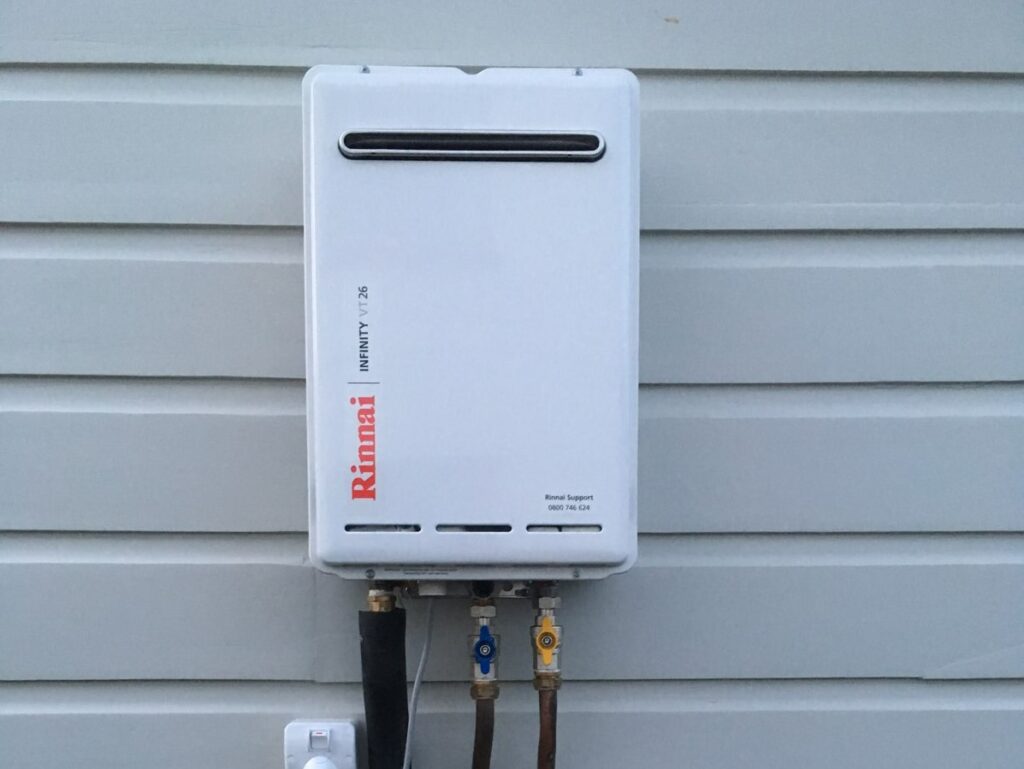Many households in New Zealand are concerned about the environment, and it is inceasingly a significant factor in purchasing decisions. Hot water systems are an essential part of any home, providing us with the hot water we need for showers, baths, washing dishes and clothes.
A number of different energy sources can power them, but natural gas is one of the most popular options, due in part to its efficiency and low cost, but also because it is environmentally friendly.
When it comes to environmental friendliness, instant gas hot water systems are hard to beat. Gas is a clean-burning fuel, so it doesn’t produce any harmful emissions. Additionally, many gas hot water systems come equipped with technology that helps to further reduce emissions.
What is a natural gas hot water system?
A natural gas hot water system is a type of hot water system that uses natural gas as its primary energy source. The gas is combusted in a burner, which heats water in a storage tank. These systems are also sometimes known as gas-fired hot water systems.
When you turn on the hot water tap, water is drawn from the mains water supply or storage tank and passes over the gas burner. The heat from the burner warms the water, and it is then delivered to your taps at the desired temperature.
What brands offer gas hot water systems in Wellington?
Two of the most well-known brands in Wellington are Rinnai with their Infinity range, and Rheem’s Integrity range.
Midea is another brand in New Zealand, although possible less well-known as Rinnai and Rheem.
What are the benefits of a natural gas hot water system?
There are a number of benefits that come with using a natural gas hot water system. These include:
Efficiency: Gas hot water systems are also very energy–efficient. They use less energy than electric hot water systems, which means they’re cheaper to run and better for the environment.
Reliable: Another big benefit of gas hot water systems is that they tend to be very reliable. Gas is a consistent fuel source, so you won’t have to worry about your system running out of power or experience any unexpected interruptions in service.
Cost-effective: One of the main benefits of gas hot water systems is that they can be quite cost-effective to operate. In fact, gas is often one of the most affordable fuel sources available, so you can expect to save money on your energy bills if you switch to a gas system.
In addition to being more affordable to run, gas hot water systems also tend to have a much longer lifespan than electric hot water systems. Electric hot water systems generally only have a lifespan of around 10 years, while gas hot water systems can last for 20 years or more. So not only will you save money on your energy bills by switching to a gas hot water system, but you’ll also save money in the long run by not having to replace your hot water system as often.
Endless hot water: All gas hot water systems come with an endless supply of hot water, so you’ll never have to worry about running out. Gas hot water systems also heat up much faster than electric hot water systems, so you won’t have to wait around for the hot water to come through.
Environmentally friendly: Natural gas is a clean–burning fuel, making it a more environmentally friendly option than some other types of hot water systems.
Versatile: Gas hot water systems are also very versatile. They can be used for a variety of applications, including space heating, domestic hot water, and even swimming pool heating. So, no matter what your needs are, you can likely find a gas system that will suit them.
Safe and reliable: Gas hot water systems are very safe and reliable. They are often preferred by families with young children or elderly members.
Quick and easy to install: Another advantage of gas hot water systems is that they are usually quick and easy to install. If you’re looking for a system that you can have up and running in no time, gas is definitely the way to go.
What are the options?
There are two main types of gas hot water systems – storage and continuous flow.
Storage gas hot water systems have a tank of water that’s heated and then stored, ready for use. They’re usually the most cost-effective option, but they can be less energy-efficient as they need to reheat the entire tank of water even if you only use a small amount.
Continuous flow gas hot water systems heat water on demand, so you’re only ever using the amount of hot water you need. They’re more energy-efficient than storage systems, but they can be more expensive to buy and install.
How much does a natural gas hot water system cost?
The cost of a natural gas hot water system will vary depending on a number of factors, such as the size of the system, the brand, and the level of efficiency. However, in Wellington (2022) you can expect to pay between $1,200 and $1,300 for an entry level 16 or 24 litre Rinnai Infinity system Continuous Gas Hot Water Heater, and as much as $3,800 for a premium 37 litre Rinnai Infinity Gas N-Series.
Rheem also offer a series of gat hot water systems and they are similar in their prices.
When it comes to choosing a gas hot water system, it’s important to consider its environmental impact. Here are some things to keep in mind when selecting a gas hot water system for your home.
1. What type of gas is being used?
There are two main types of gas used in hot water systems – natural gas and LPG (liquefied petroleum gas). Natural gas is a cleaner burning fuel and is the preferred choice for many households. LPG is a fossil fuel and is not as environmentally friendly as natural gas.
2. The size of the system
When it comes to gas hot water systems, size does matter. A larger system will use more gas and therefore have a greater environmental impact. If you have a large family or high hot water demand, consider a system with a higher capacity to help reduce your environmental footprint.
3. The efficiency of the system
The efficiency of a gas hot water system is measured by its stars. The more stars, the more efficient the system and the lower the environmental impact. Look for a five-star rated system for the best environmental performance.
4. The location of the system
The location of your gas hot water system can also impact its environmental friendliness. If the system is located inside your home, it will be subject to the temperature of the surrounding areas. This means that the water in the system will need to be heated more often, using more gas and increasing its environmental impact.
5. The climate
The climate in which you live will also impact the environmental friendliness of your gas hot water system. If you live in a temperate climate, your system will not need to work as hard to heat the water and will have a lower environmental impact.
6. The maintenance of the system
Gas hot water systems are very low maintenance and easy to keep in good working order. Having said that, a gas hot water system that is well-maintained will be more efficient and have a lower environmental impact than one that is not. Make sure to have your system serviced regularly and to follow the manufacturer’s instructions for proper maintenance.
7. The supplier of the gas
The company that supplies your gas can also impact its environmental friendliness. If the company uses renewable energy to generate the gas, it will have a lower environmental impact than a company that doesn’t.
8. The cost of the gas
While the cost of gas is not directly related to its environmental impact, it is important to consider when choosing a gas hot water system. A more expensive gas will have a greater environmental impact than a cheaper one.
9. The warranty
When purchasing a gas hot water system, it’s important to choose one with a good warranty. This will ensure that if something goes wrong with the system, it will be covered and you won’t have to replace it as often, reducing its environmental impact.
10. The manufacturer
The manufacturer of your gas hot water system can also impact its environmental friendliness. Choose a reputable company that has a good track record when it comes to environmental responsibility.
When it comes to choosing a gas hot water system, there are many things to consider. Keep these things in mind to help you select a system that is environmentally friendly and that will best meet your needs.
An environmentally friendly gas hot water system is a great way to reduce your carbon footprint and save money on your energy bills. With so many different options available, there’s sure to be a system that’s perfect for your home.
How can I save money with gas hot water systems?
There are a number of ways to save money with a gas hot water system. The most obvious is to select a system that is energy-efficient. You can also take measures to reduce the amount of hot water you use and to make your system more efficient.
In terms of initial costs, a gas hot water system will generally be more expensive than an electric one. However, over time, the costs even out. In fact, gas is usually cheaper than electricity, so you’ll save money in the long run.
Here are some tips for saving money with a gas hot water system:
1. Choose an energy-efficient model. There are a number of high-efficiency gas water heaters on the market. These models cost more upfront, but they will save you money on your energy bills in the long run.
2. Reduce the amount of hot water you use. You can save a significant amount of money simply by using less hot water. Consider installing low-flow showerheads and faucet aerators. You may also want to invest in a tankless water heater, which heats water on demand rather than storing it in a tank.
3. Lower the temperature of your water heater. You probably don’t need your water to be as hot as it is currently set. Hot water cylinders need to be set to 60 degrees to avoid Legionella (an aquatic bacteria), but you can save energy by turning it down to 55degrees.
5. Select the right size water heater. A water heater that’s too small will have to work overtime to meet your hot water needs. Conversely, a water heater that’s too large will be a wasted investment. Make sure to select a water heater that’s the right size for your home and family.
Gas hot water systems are a great way to save money on your energy bills. By choosing an energy-efficient model and taking measures to reduce hot water usage, you can significantly lower your costs.
About Paramount Plumbing
Paramount Plumbing and Gas are leading Plumbers in Wellington, and specialise in gas hot water systems (and hot water cylinders).
Save up to 40% on your energy bill with Rinnai. Rinnai infinity systems provide an endless supply of hot water, operating at high efficiency even when demand is high.
Call Paramount Plumbing on 0800 02 72 72 or send an email to: info@paramountplumbing.nz for Rinnai Infinity hot water system services in Wellington.


